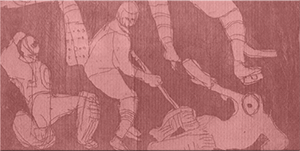Publication History
Sarah Binks
Sarah Binks - at least the poetry that would define her - was largely devised in Hiebert's youth and refined while he was teaching at the University of Manitoba where Hiebert presented Sarah Binks's poetry "at various local academic and community gatherings" (Panofsky 71). Initially Hiebert sent the manuscript to Macmillan Company of Canada, who claimed "the Canadian reading public would not take to it" (Gallant 17) and rejected it. After Sarah Binks was rejected by J.M. Dent and Sons, Hiebert sought a "little Jewish publishing firm in Winnipeg" (Siemans 67) to publish his book. Hiebert offered them the book for three hundred dollars, citing that "all I wanted was a book, you see, to give to people", but Ruth Panofsky alleges "given Hiebert's racist stereotype of the McCohen and Meyers Stock Conditioner Company, which supplied the horse thermometer that caused Sarah's untimely death from mercury poisoning, the Press did not view the work as a viable investment" (74). When they passed on the book, Hiebert took his manuscript to Oxford University Press (OUP) Canada in 1940, but after a number of revisions it was not published until 1947.
The first printing of the book was printed unevenly with some typographical errors according to representative of Oxford University Press Canada Bill Clarke, who suggested "the production standards of Oxford University Press Canada were not to be compromised" (Panofsky 83) when discussing a reprint. The library has a first edition, but it is a second state printing, meaning that the matrix used in the printing press had been corrected for subsequent impressions (copies) of the book and so the errors that Clarke caterwauled against were indeed corrected.

The OUP Canada reprinted the book several times, and Special Collections also has Carlyle King's edition of the third impression (1950):

The sales were very respectable, and the book itself still sold "close to 2,000 copies every year" (Siemans 68) thirty years after the original publication. These same strong sales delayed Sarah Binks's publication in McCelland & Stewart's New Canadian Library until 1965 (although the copyright appears as 1964 on the colophon of the earliest NCL publication of the book) (Friskney 103; 188); Sarah Binks was included in the Humour five-pack, an NCL promotion that ran in 1972 in order to stimulate sales and reduce stock, along with Stephen Leacock's Sunshine Sketches of a Little Town, Thomas Haliburton's The Clockmaker, Earle Birney's Turvey, and Mordecai Richler's The Incomparable Atuk (Friskney 231). Sarah Binks has been reprinted in the NCL in 1971, in 1995 with a new afterword by Charles Gordon, and in 2010.

Willows Revisited

Willows Revsited was published in 1967 by McClelland and Stewart and did not achieve the success of its prequel, Sarah Binks, though Hiebert himself suggests that the lack of critical interest is at least somewhat undeserved: "some of that stuff is pretty darned good poetry" (Siemans 72). Hiebert does admit, however, that the book was contrived and perhaps lacks some of the originality of the first.

The University of Saskatchewan Library, Special Collections has a signed copy of a first edition of Willows Revisited, which happens to be the only edition. It was never republished as Sarah Binks was, the interest of which was revived by its republication in 1995 and its feature on CBC's Canada Reads in 2003.
Friskney, Janet B. New Canadian Library: The Ross-McClelland Years 1952-1978. Toronto: U of Toronto P, 2007.
Gallant, Mavis. "Sarah of Saskatchewan." Montreal Standard, 17 Apr. 1948: 7, 14, 17.
Panofsky, Ruth. "'Literary swan or 'village goose': Paul Hiebert's Sarah Binks." Publishing History 56 (2004): 71-88.
Siemans, Reynold. "Sarah Binks in Retrospect: A Conversation with Paul Hiebert." Journal of Canadian Fiction. 19 (1977): 65-76.
comments: ua.sc@usask.ca
